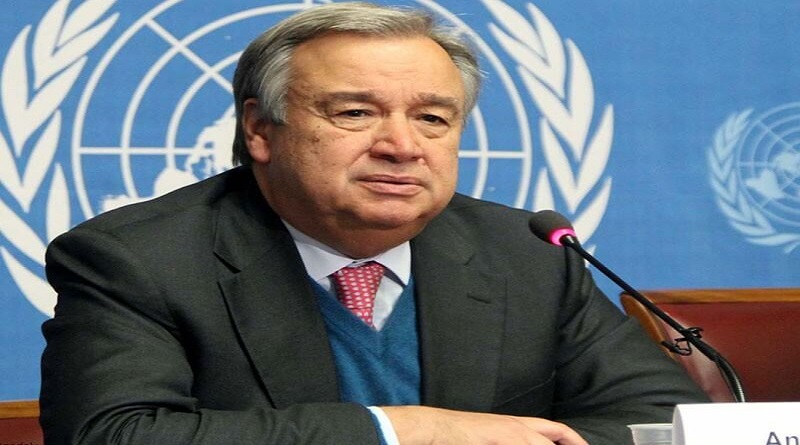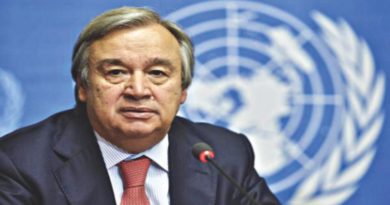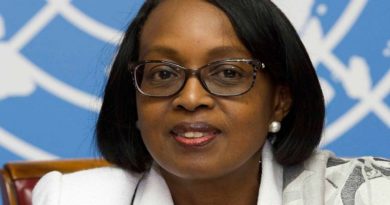Worsening climate crisis: UN looks to countries, private sector to mobilize resources
Facing the increasing impacts of climate change and a chronic and global underfunding of efforts to scale up action to achieve the Sustainable Development Goals (SDGs), world leaders from governments and the private sector are set to announce new plans and financing initiatives at the UN High-Level Dialogue on Financing for Development in New York.
The announcements by world leaders, CEOs as well as philanthropy and civil society heads today are set to demonstrate increased resolve to mobilize resources, generate action and restore momentum to achieve the globally-agreed goals to eliminate poverty, promote prosperity and well-being while protecting the environment.
As part of the UN’s week of action for people and the planet, the High-Level Dialogue held under the auspices of the UN General Assembly will review the many financing commitments that were made or are expected to be made at the high-level meetings this week, including at the Climate Action Summit, the SDG Summit and the High-level Midterm Review of the Samoa Pathway.
The Climate Action Summit on Monday saw announcements by countries to increase their contributions to the Green Climate Fund and their assistance for climate financing, as well as announcements by banks and asset management companies to redirect their investments with a focus on sustainability concerns. At the SDG Summit on Tuesday-Wednesday, governments announced commitments to finance efforts on a range of programmes to achieve various goals.
In his opening remarks, the President of the UN General Assembly, Tijjani Muhammad-Bande, said that, “Today’s High-Level Dialogue provides an opportunity to evaluate implementation of this framework. Throughout the SDG Summit, we heard from many Member States that funding remains one of the biggest impediments to realizing the SDGs. We need about $2.5 trillion a year to close the finance gap. This will require our urgent attention and action.”
The High-Level Dialogue will hear from more nearly 20 heads of state and government and as many ministers, joined by philanthropy and business leaders, including Bill Gates, who will sound the alarm about the insufficient pace in closing the gap in investments that are critical to achieving the Sustainable Development Goals.
More than 20 initiatives are expected to be announced and reported on. Among them is the 2X Challenge by the Development Finance Institutions of Canada, Denmark, Finland, France, Germany, Italy, Japan, the Netherlands, Sweden, the United Kingdom, and the United States, which aims to mobilize $2.5 billion to invest in global women’s economic empowerment.
UN Deputy-Secretary-General Amina Mohammed underlined the vast financing gap. “The bottom line is that we are still not on track. And the urgency of achieving the goals, of which ambitious climate action is a part, demands that we pick up the pace.”
Since the adoption of the Addis Ababa Action Agenda in 2015 — the roadmap for financing the SDGs — there has been slow economic growth, increasing inequalities and growing debt distress in many of the world’s most vulnerable countries. In 2018, net Official Development Assistance totaled $149 billion, down by 2.7 per cent in real terms from 2017.
Rising debt levels can hamper the ability of countries to invest in sustainable development. Climate-related disasters dramatically exacerbate the debt challenges in small island developing states, who struggle to repay their loans as their economies are crippled by ever more intense and frequent disasters.
However, the path to financing the SDGs is not all bleak.
“Financing is the test of our seriousness,” said UN Secretary‐General António Guterres in his remarks, “Without resources, we will simply not deliver for people or planet. But with adequate, predictable, sustainable funding, everything is possible.” He also referred to his Strategy for Financing the 2030 Agenda which was announced in 2018 and is being rolled out by the UN this year to support countries and their partners.
Many countries are now incorporating the SDGs into their national budgets. There are opportunities for acceleration, driven by countries’ national sustainable development strategies, innovative partnerships and the potential of data and new technologies. There is also a growing interest in SDGs from the private sector, which increasingly sees the economic case for sustainable development. The financial industry for instance reported on the growing importance of factoring climate-related risks into decision-making as well as opportunities for financial innovation and digital finance to unlock new resources for the SDGs.
Although estimates vary, the cost of achieving the Goals would require annual investments amounting to trillions of dollars, which could be achieved, in large part, through the redirection of major investments to the green economy. Global aggregates also obscure some of the real challenges and opportunities in specific country and regional contexts which has led to a renewed interest in understanding the investment needs at the national level and the need for strengthened domestic resource mobilization to finance national SDG development plans.
A Financing for Development Forum will take place in April 2020 to follow up and review the progress on the Addis Agenda and related financing commitments.




